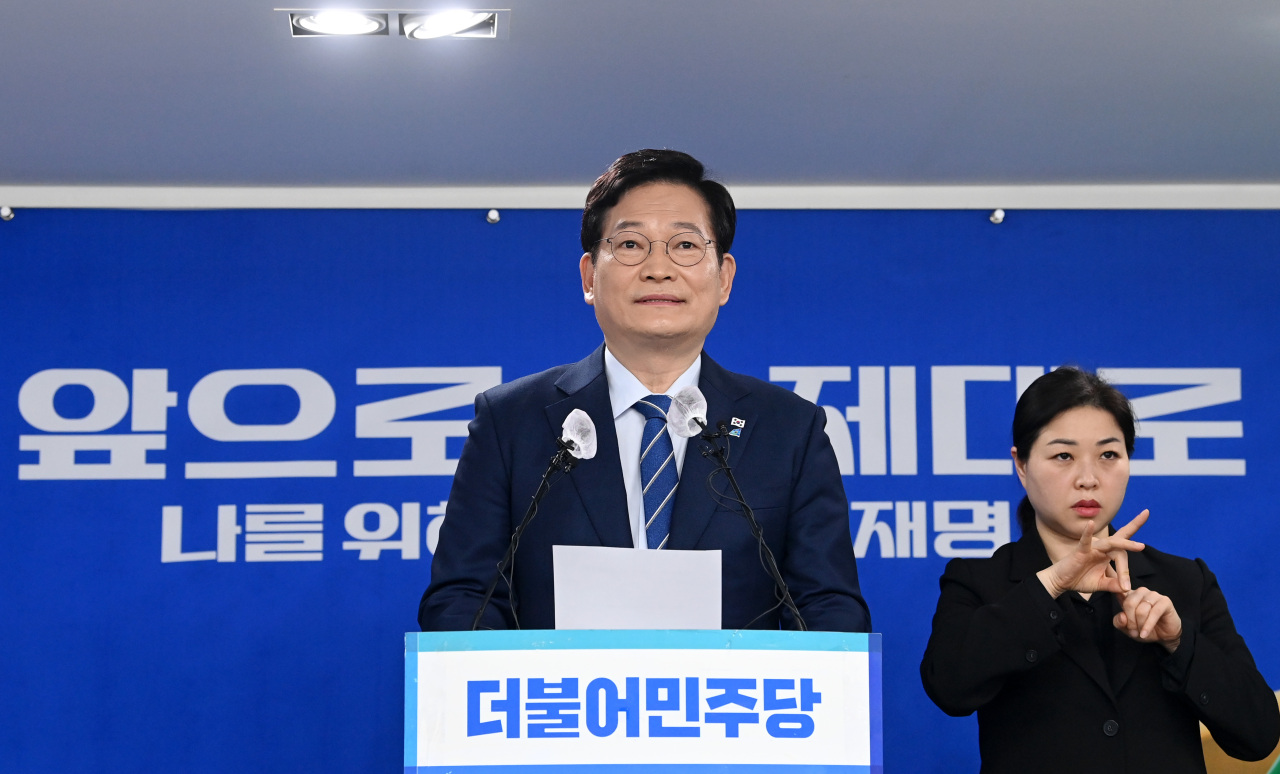The head of the ruling Democratic Party of Korea announced he will not seek reelection in the next National Assembly, as part of large-scale reforms to the party aimed at boosting support for its presidential nominee, Lee Jae-myung.
Rep. Song Young-gil, a five-term lawmaker and the chairman of the Democratic Party, said in a press conference Tuesday that he will not seek to run again as a lawmaker in the next parliamentary elections in 2024. He also announced his party will not make nominations for three lawmaker seats up for a vote on March 9 as by-elections on the sidelines of the presidential election.
The ruling party will not be nominating candidates for the constituencies of Jongno in central Seoul, Anseong in Gyeonggi Province and a district of Cheongju, North Chungcheong Province, according to Song.
The chairman said his party will look to introduce new bylaws for the party that will limit the number of terms its lawmakers can serve for the same constituency to three, while nominating more than 30 percent of candidates for the regional elections in June from among younger generations.
"The historical calling before us today is the victory of candidate Lee Jae-myung," Song said at the press conference. "I will be the first to give up all the privileges and serve as a foundation for the birth of the Lee Jae-myung government."
Song added the Democratic Party will concede the seats of Reps. Yoon Mi-hyang, Lee Sang-jik and Park Duk-hyum, all of whom were voted to be expelled by the parliamentary Ethics Committee after being marred in sizable controversies.
"The fact that the voices calling for change in the ruling administration are loud today shows that our efforts (for change and reforms) have fallen short," Song said.
"We weren’t apt in solving the escalating social polarity and inequality, and we did not apologize appropriately at the right time on failures of real estate policies and failures over examining people for high-ranking positions."
Song’s announcement comes as the Democratic Party’s presidential nominee Lee remains weak in support ratings despite rigorous campaign efforts. His level of support has stayed between 30 and 40 percent in all polls to date, even as his opponents have been mired in controversies and seen significant shifts in support.
The latest Realmeter poll of 3,046 adults conducted from Jan. 16 to 21 found Lee at 36.8 percent, up 0.1 percentage point from the previous week. He was 5.2 percentage points behind his main rival Yoon Suk-yeol of the main opposition People Power Party at 42 percent.
Diagnosing the sluggish change in support for Lee as part young voters’ disapproval of politics swayed by older, long-serving politicians, Song has taken the lead to drive the "586 Generation" away from the center stage and bring "fresh water" into politics.
The "586 Generation" refers to those who were born in Korea in the 1960s, rallied against dictatorship in the 1980s and who are now mostly in their 50s. The generation accounts for a large portion of the Democratic Party’s leadership and voter base.
"We will set up a solid foundation for a culture of politics that constantly requires innovation and diligence, or politics that sees fresh water instead of standing still."
Song's push for generational reform comes just two days after Rep. Kim Jong-min of the same party, one of the key members of the pro-Moon Jae-in administration caucus, raised the need for older politicians like himself to pass on their seats and power to younger figures.
Kim criticized that the 586 Generation -- including himself -- jumped into politics with hopes for democratization 30 years ago, but the country only saw its polarization deepen while its birthrate has fallen to the lowest in the world.
A day later, seven key aides of Lee Jae-myung announced they would not seek any public official post should he be elected, emphasizing that the party will look for fresh talent to drive innovation.
Analysts say the move is ambitious, but voters’ distrust of the promises of politicians undermines the potential for Lee to take the lead in the race. The promises could appear in vain and may be broken later if circumstances change, they say.
"The fact that the ruling party is giving up big constituencies is meaningful in itself, but too many times we’ve seen such bold promises being broken," local political commentator Hwang Tae-soon told The Korea Herald.
"And it certainly wouldn't be easy for this 586 Generation to actually give up power and move to the back. It could be good that young people are given opportunities, but the Democratic Party of Korea wouldn’t be the only one to do that in this time of politics when young voters are especially important."
For more information regarding the survey results, visit the National Election Survey Deliberation Commission homepage.By Ko Jun-tae (
ko.juntae@heraldcorp.com)






![[Herald Interview] 'Trump will use tariffs as first line of defense for American manufacturing'](http://res.heraldm.com/phpwas/restmb_idxmake.php?idx=644&simg=/content/image/2024/11/26/20241126050017_0.jpg)
![[Exclusive] Hyundai Mobis eyes closer ties with BYD](http://res.heraldm.com/phpwas/restmb_idxmake.php?idx=644&simg=/content/image/2024/11/25/20241125050044_0.jpg)
